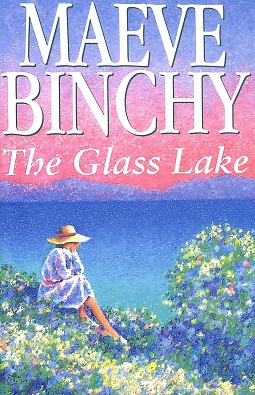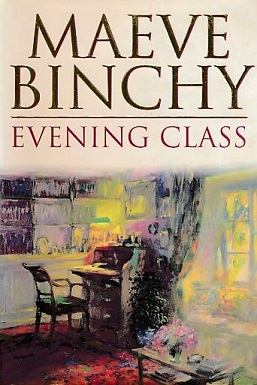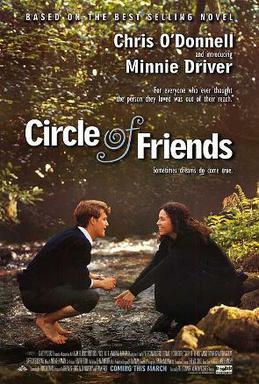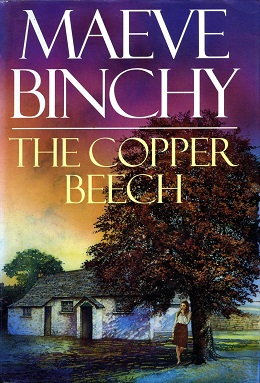
Anne Maeve Binchy Snell was an Irish novelist, playwright, short story writer, columnist, and speaker. Her novels were characterised by a sympathetic and often humorous portrayal of small-town life in Ireland, and surprise endings. Her novels, which were translated into 37 languages, sold more than 40 million copies worldwide. Her death at age 73, announced by Vincent Browne on Irish television late on 30 July 2012, was mourned as the death of one of Ireland's best-loved and most recognisable writers.
Events from the year 1990 in Ireland.

The Glass Lake is a 1994 novel by the Irish author Maeve Binchy. The action takes place in a rural Irish village as well as in London in the 1950s. It is notable as the last of Binchy's novels to be set in the 1950s. Binchy explores the roles of women in Irish society and inconstant lovers, and uses an operatic plot to hold the reader's attention.

Evening Class is a 1996 novel by the Irish author Maeve Binchy. It was adapted as the award-winning film Italian for Beginners (2000) by writer-director Lone Scherfig, who failed to formally acknowledge the source, although at the very end of the closing credits is the line 'with thanks to Maeve Binchy'.

Quentins is a 2002 novel by the Irish author Maeve Binchy. The title refers to Quentins Restaurant, a fictional upscale dining establishment in central Dublin, Ireland. The restaurant was referenced numerous times in previous Binchy titles; this novel explores its 30-year history as well as the lives of its patrons. The novel was produced as a BBC Word for Word audiobook in 2003.
Deirdre Purcell was an Irish author, actress, and journalist.

Light a Penny Candle is a 1982 novel by the Irish author Maeve Binchy. Her debut novel, it follows the friendship between an English girl and an Irish girl over the course of three decades, beginning with the English girl's stay in Ireland during the Blitz. It is one of Binchy's best-known novels.

Tara Road is a 2005 film directed by Gillies MacKinnon. It is based on the 1998 novel of the same name by Maeve Binchy.

Firefly Summer is a 1987 novel by the Irish author Maeve Binchy. Set in an Irish small town, this third novel by Binchy depicts the changes that affected the country in the late twentieth century. BBC Radio 4 produced a 6-episode, 3-hour dramatization of the novel in 2008.

Circle of Friends is a 1995 film directed by Irish filmmaker Pat O'Connor, and based on the 1990 novel of the same name written by Maeve Binchy.

The Copper Beech is a 1992 novel by the Irish author Maeve Binchy. Set in the 1950s and 1960s, the storyline follows the lives of 12 characters living in a small Irish town, in chapters with interlocking plot elements. The novel was recorded as a BBC audiobook in 2007.

Heart and Soul is a 2008 novel by the Irish author Maeve Binchy. The plot centers around what Binchy terms "a heart failure clinic" in Dublin and the people involved with it. Several characters from Binchy's previous novels, including Evening Class, Scarlet Feather, Quentins, and Whitethorn Woods, make appearances.

Echoes is a 1985 novel by the Irish author Maeve Binchy. As Binchy's second novel, it explores various themes of Irish small-town life, including social classes and expectations, the paucity of educational opportunities before the introduction of free secondary education in 1967, and women's roles. A four-part television miniseries was adapted from the novel in 1988.

Nights of Rain and Stars is a 2004 novel by the Irish author Maeve Binchy.
Gordon Snell is a British author of children's literature and scriptwriter. He was married to Irish author Maeve Binchy from 1977 until her death in 2012. He lives in the home that he shared with his late wife in Dalkey, outside of Dublin, Ireland.

Minding Frankie is a 2010 novel by the Irish author Maeve Binchy.

Silver Wedding is a 1988 novel by the Irish author Maeve Binchy. Set in London, Dublin, and the west of Ireland in the year 1985, the novel explores the lives and inner feelings of a couple and their family and friends who are about to celebrate the couple's 25th wedding anniversary.

Chestnut Street is a 2014 short story collection by the Irish author Maeve Binchy. It was published posthumously by her husband, Gordon Snell. It contains 36 short stories, the majority never before published, which Binchy had written over a period of decades. Each story centers around a different resident or family living on or connected to the fictional Chestnut Street in Dublin.
Róisín Ingle is an Irish writer – a journalist, columnist and editor – as well as a podcast presenter and producer. She grew up in Sandymount, Dublin and, except for a brief stint in the UK, has lived and worked in Ireland for most of her life. She started working at the Sunday Tribune and then moved to the Irish Times in the late 1990s, where she has worked since, notably producing a widely read lifestyle column, working as a features editor and producing multiple series of podcasts. Selections of her columns, which number more than 4,000, have been collected in two books. Ingle has also co-produced and contributed to another publication, and edited others, notably a collection of work by Maeve Binchy.
Mary Maher was an American-born Irish trade unionist, feminist, and journalist. She was a founder of the Irish Women's Liberation Movement and the first women's editor at The Irish Times newspaper, where she worked for 36 years.















